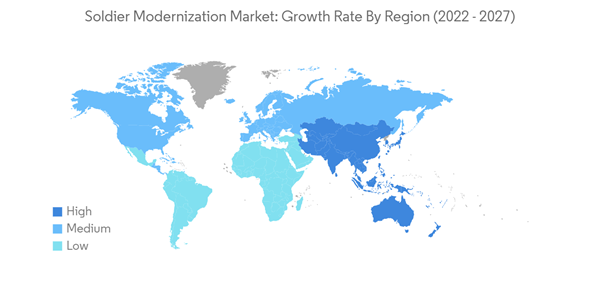The COVID-19 pandemic impact on the defense industry was low as the investments in procurement and development of new soldier systems remained unaffected. However, the pandemic led to disruptions in the supply chain in the defense sector, owing to lockdown in some countries, which led to slight delays in the delivery of the final products.
Over the past few years, the military spending of various countries in the world has increased robustly owing to factors such as the increased border conflicts and growth in terrorist and hostile groups. The countries are robustly investing in the research and development of advanced soldier systems to enhance their effectiveness on the battlefields to decrease the risks the troops face. Such investments are anticipated to drive the growth of the market.
The governments are working with companies towards the integration of advanced technologies like artificial intelligence, the Internet of Things (IoT) for the military, wearable devices, augmented reality, etc., for the soldiers.
However, the slow progress in decision-making at the government level has delayed many modernization programs in several developing countries over the years. The uncertainties, thus, created in terms of the program completion and associated timelines are currently challenging the players in the market.
Key Market Trends
The Increasing Need to Improve the Soldier Effectiveness and Efficiency is Driving the Market
The changing battlefield scenarios are demanding the militaries to equip the soldiers with newer technologies that help them adapt to the changes. The soldier systems need to cater to five primary functional requirements, namely, lethality, survivability, command and control, sustainment, and mobility of the soldier on the battlefield. In this regard, countries are investing in the research and development of advanced soldier systems to enhance their effectiveness on the battlefield, help them gain a tactical advantage, and decrease the overall troop casualties. The areas of interest range from lethality and protection to mobility, command, and control (C2) technology, communication, support, and search and rescue systems across a wide-ranging cross-section of ground, airborne, and maritime environments. For instance, United States Army is currently in plans to procure enhanced protection systems for its troops under the Integrated Head Protection System (IHPS). In September 2021, Avon Protection was awarded a contract worth USD 87.6 million to develop and deliver IHPS to the US Army over a period of two years. The procurement of IHPS is a part of the Soldier Protection System (SPS) program, which also includes the development of Vital Torso Protection (VTP) and Torso and Extremity Protection (TEP). Under the SPS program, the Army plans to equip frontline soldiers with advanced personal protective equipment. Thus, the growing need for soldier modernization is currently driving investments into the market.
Asia-Pacific is Projected to Exhibit the Highest Growth Rate in the Market
In terms of geography, Asia-Pacific is projected to register the highest CAGR during the forecast period. Countries in the Asia-Pacific region, such as China, India, Japan, and South Korea, are some of the biggest defense spenders in the world. China’s indigenous technological and manufacturing capabilities give it a great edge in terms of innovation and the implementation of soldier modernization programs. The country has made both technical and organizational changes to modernize its army. For instance, In January 2021, China unveiled a new type of military-use exoskeleton suit that is powered and can be used for carrying ammunition. Earlier in late 2020, a non-powered exoskeleton suit entered service with the People's Liberation Army (PLA) border defense troops for various missions, including supply delivery, patrol, and sentry duty. On the other hand, the Indian government has undertaken several emergency procurement programs over the last two years to strengthen the capabilities of frontline military personnel amid the growing tensions along the Line of Actual Control. Recently, in January 2022, the Indian Ministry of Defence awarded a contract to Saab to deliver AT4 single-shot support weapons to the Indian Army and Indian Air Force. It is designed to be operative against combat vehicles, tanks, landing craft, aircraft, helicopters, and armored vehicles. Such developments are envisioned to further propel the region to dominate the market in the years to come.
Competitive Landscape
The soldier modernization market is highly fragmented, with several players accounting for significant amounts of shares in the market. Some of the prominent companies in the soldier modernization market are Thales Group, Elbit Systems Ltd, BAE Systems PLC, L3Harris Technologies Inc., and Leonardo S.p.A. Several companies have formed long-term partnerships with the armed forces to upgrade and enhance the battlefield capabilities of infantry soldiers as well as for the development of future soldier modernization programs of the defense ministry. Companies are investing heavily in research and development for the innovation of new and advanced products and technologies that may help the soldiers on the frontline have a tactical advantage over their rivals. The development of exoskeletons, versatile technology platforms in terms of connectivity, dual role weapon sights, and integration of VR technology for the training of soldiers are some of the innovations of the companies that received attention in recent times from various armed forces around the world. For instance, in December 2021, Thales launched the XTRAIM weapon sight that provides day/night de camouflage capabilities, which can be equipped with all light machine guns (Minimi) and shoulder-fired assault rifles (HK416). Such breakthrough technologies are expected to help the companies gain new contracts and increase their market presence.
Additional Benefits:
- The market estimate (ME) sheet in Excel format
- 3 months of analyst support
This product will be delivered within 2 business days.
Table of Contents
Companies Mentioned (Partial List)
A selection of companies mentioned in this report includes, but is not limited to:
- BAE Systems PLC
- Elbit Systems Ltd
- Leonardo S.p.A.
- Thales Group
- L3Harris Technologies Inc.
- Teledyne Technologies Incorporated
- Ultra Electronics Holdings PLC
- Rheinmetall AG
- Safran SA
- Saab AB
- Northrop Grumman Corporation
- Cobham PLC










